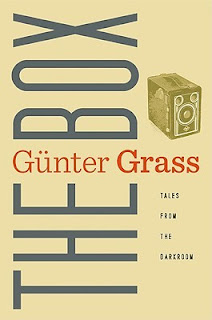Günter Grass, one of Germany's greatest authors, has written a biography, not just one but three books where he talks about his life, growing up in between the two wars that were going to destroy the Europe that was known before, becoming a German soldier in WWII, spending his years in Russia, coming back to a country that was destroyed, a different part of the country than where he came from, as well. His first steps into becoming an artist, his apprenticeship as a stonemason in order to become a sculptor. Many, many stories.
Günter Grass doesn't keep anything a secret. He mentions how and why he volunteered to go to war. He also describes many events that he was going to use in his many novels later. Even if you haven't read any of his novels, this is a great account not just of the life of a writer who was awarded the Nobel Prize for literature but also of a simple German boy who was born at the wrong time.
If you grew up in post-war Germany with parents who had been about the author's age (like me), a lot of the stories sound familiar (apart from the volunteering part).
Brilliant, remarkable writing. I am not surprised this author received the highest prize you can get.
I read this in the original German edition and am looking forward to the two next parts of the trilogy:
"
Die Box. Dunkelkammergeschichten" (
The Box: Tales from the Darkroom) (Autobiographical Trilogy #2) - 2008
"
Grimms Wörter. Eine Liebeserklärung" (Autobiographical Trilogy #3, no translation, yet) - 2010
Klappentext:
"
In this extraordinary memoir, Nobel Prize-winning author Günter Grass remembers his early life, from his boyhood in a cramped two-room apartment in Danzig through the late 1950s, when The Tin Drum was published.
During the Second World War, Grass volunteered for the submarine corps at the age of fifteen but was rejected; two years later, in 1944, he was instead drafted into the Waffen-SS. Taken prisoner by American forces as he was recovering from shrapnel wounds, he spent the final weeks of the war in an American POW camp. After the war, Grass resolved to become an artist and moved with his first wife to Paris, where he began to write the novel that would make him famous.
Full of the bravado of youth, the rubble of postwar Germany, the thrill of wild love affairs, and the exhilaration of Paris in the early fifties, Peeling the Onion -- which caused great controversy when it was published in Germany -- reveals Grass at his most intimate."
As any good author, he has also read a lot and mentions many of them in the book.
Beecher Stowe, Harriet "
Uncle Tom's Cabin" - 1852
Coster, Charles de "The Legend of Thyl Ulenspiegel and Lamme Goedzak" - 1867
Dahn, Felix "Ein Kampf um Rom" (A Struggle for Rome) - 1876
Dickens, Charles "
David Copperfield" - 1849
Döblin, Alfred "
Berlin Alexanderplatz. The Story of Franz Biberkopf" (
Berlin Alexanderplatz) - 1929
Dos Passos, John "Manhattan Transfer" - 1925
Dostoevsky, Fyodor "Demons" - 1872
Dumas, Alexandre "The Three Musketeers" - 1844
Fallada, Hans "Little Man, What Now?" - 1932
Faulkner, William "
Light in August" - 1932
Fülöp-Müller, René "Der heilige Teufel. Rasputin und die Frauen" (Rasputin: The Holy Devil) - 1927
Goethe, Johann Wolfgang von "Wahlverwandschaften" (Elective Affinities) - 1809
Greene, Graham "The Heart of the Matter" - 1948
Hamsun, Knut "August" - 1930
Hamsun, Knut "Hunger" - 1890
Joyce, James "
Ulysses" - 1922
Jünger, Ernst "In Stahlgewittern" (Storm of Steel) - 1920
Keller, Gottfried "Ferien vom Ich" [
Holidays from myself] - 1915
Keller, Gottfried "Green Henry" - 1853
Lagerlöf, Selma "Gösta Berling's Saga" - 1891
Mereschkowski, Dmitry "The Romance of Leonardo da Vinci" (Воскресшие боги. Леонардо да Винчи) - 1900
Meyer, Conrad Ferdinand "Jürg Jenatsch. Thirty Years War" (Jürg Jenatsch) - 1876
Miłosz, Czesław "The Captive Mind" (Zniewolony umysł) - 1953
Raabe, Wilhelm "Chronik der Sperlingsgasse" [
Chronicles of Starling Alley] - 1856
Raabe, Wilhelm "Hungerpastor" [
Hungerpastor] - 1864
Remarque, Erich Maria "
All Quiet on the Western Front" (
Im Westen nichts Neues) - 1829
Storm, Theodor "
The Rider on the White Horse" (
Der Schimmelreiter) - 1888
Wilde, Oscar "
The Picture of Dorian Gray" - 1890
And some authors where he didn't mention a particular book.
Aristotle - 384-322 BC
Dickens, Charles - 1812-1870
Heidegger, Martin - 1889-1976
Spinoza, Baruch - 1632-77
Sudermann, Hermann - 1857-1928
Twain, Mark - 1835-1910
Günter Grass "whose frolicsome black fables portray the forgotten face of history" received the Nobel Prize for Literature in 1999.
I contribute to this page:
Read the Nobels and you can find all my blogs about Nobel Prize winning authors and their books
here.













